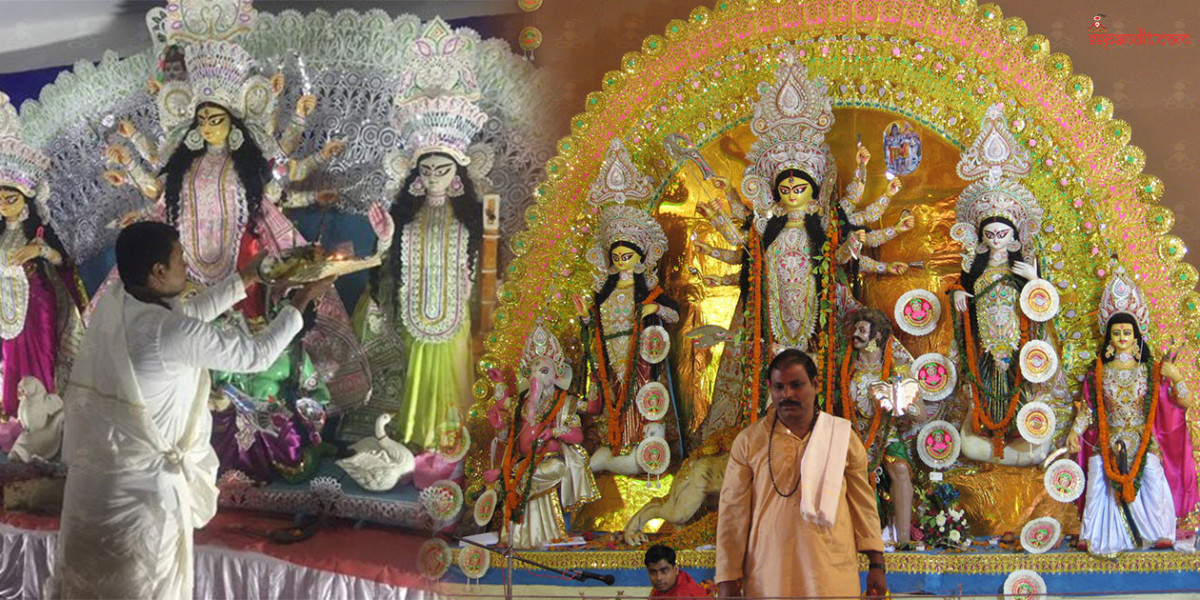Durga Puja, one of the most significant festivals in the Hindu calendar, is a time for devotees to celebrate the divine feminine power symbolized by Goddess Durga. The festival is not only a religious occasion but also a cultural phenomenon deeply rooted in Indian tradition, art, and music. Central to this grand celebration is the presence of a Pandit, or Hindu priest, who plays a pivotal role in the rituals, prayers, and ceremonies associated with Durga Puja.
In this article, we will explore the role of a Pandit for Durga Puja, the significance of their involvement, the rituals they perform, and how to find a qualified Pandit for your Durga Puja celebrations.
The Importance of Durga Puja
Durga Puja marks the victory of good over evil as Goddess Durga triumphs over the buffalo demon, Mahishasura. The festival is celebrated with great enthusiasm, particularly in West Bengal, Assam, Bihar, Jharkhand, Odisha, and various other parts of India. It typically lasts for five days, starting from Shashti (the sixth day) and concluding on Vijayadashami (the tenth day), although the preparation and excitement begin weeks in advance.
During these days, beautifully crafted idols of Goddess Durga are installed in homes and public pandals (temporary structures), and elaborate rituals are performed to invoke the Goddess's blessings for protection, prosperity, and happiness. The role of a Pandit in conducting these rituals is indispensable, as they are considered the link between the devotees and the divine.
Role of a Pandit in Durga Puja
A Pandit is a learned and trained individual who is well-versed in Hindu scriptures, rituals, and mantras. In the context of Durga Puja, the Pandit serves as the guide and conductor of the various ceremonies that are performed to honour Goddess Durga. These ceremonies are intricate, requiring the chanting of sacred hymns, the offering of flowers, fruits, and sweets, and the lighting of lamps. Each ritual holds deep spiritual significance, and it is the Pandit's knowledge and expertise that ensure everything is done according to traditional customs.
Key Rituals Performed by a Pandit During Durga Puja
Bodhan: The ritual of Bodhan marks the commencement of Durga Puja on the sixth day (Shashti). This is when the Pandit invokes the Goddess into the idol or image, awakening her divine presence. The Bodhan ritual is a critical aspect of the festival, as it symbolizes the arrival of the Goddess to bless her devotees.
Chandipath: One of the most significant rituals of Durga Puja is the recitation of the Chandi Path, a collection of 700 verses from the Markandeya Purana. The verses narrate the story of the Goddess's battle against Mahishasura and her ultimate victory. The Pandit recites these verses with precision, as it is believed that listening to the Chandi Path invokes the Goddess’s divine energy and blessings.
Saptami Puja: On the seventh day, known as Saptami, the ritual of Nabapatrika is performed. The Pandit prepares a collection of nine plants symbolizing the nine forms of Goddess Durga. These plants are bathed in holy water and placed alongside the idol of the Goddess. The Pandit leads the prayers and offerings during this time, symbolizing the nurturing aspect of the Goddess.
Sandhi Puja: Perhaps one of the most important rituals in Durga Puja is the Sandhi Puja, performed at the juncture of Ashtami and Navami (the eighth and ninth days). This ritual celebrates the moment when Goddess Durga transformed into the fierce form of Chamunda to slay Chanda and Munda, two of Mahishasura's generals. The Pandit performs this puja with great devotion, offering special items such as 108 lotuses, lighted lamps, and 108 earthen lamps to the Goddess.
Vijayadashami: The final day of Durga Puja, Vijayadashami, symbolizes the victory of good over evil. On this day, the Pandit leads the devotees in bidding farewell to the Goddess as her idol is immersed in water. This immersion ritual, known as Visarjan, is emotional and signifies the return of the Goddess to her heavenly abode. The Pandit chants mantras that invoke the Goddess's blessings for the coming year.
Finding a Qualified Pandit for Durga Puja
With the increasing popularity of Durga Puja outside India, many people are eager to celebrate the festival with authenticity. This has led to a growing demand for Pandits who can conduct the puja rituals, both in India and abroad. Here are some tips on how to find a qualified Pandit for your Durga Puja celebration:
Local Temples: Many Hindu temples have Pandits who offer services for home pujas and ceremonies. Contacting your local temple is often the easiest way to find a knowledgeable and qualified Pandit.
Online Platforms: In today’s digital age, there are several online platforms where you can find Pandits who specialize in conducting Durga Puja. These platforms allow you to book a Pandit for a specific date, location, and type of puja. Some platforms even offer virtual pujas, where the Pandit performs the rituals via video call, which is especially useful for devotees living abroad.
Community Networks: If you live in a region with a significant Bengali or Hindu community, you can often find Pandits through community networks. Word of mouth and personal recommendations are great ways to ensure you find a Pandit who is experienced and respected within the community.
Qualifications and Experience: When selecting a Pandit for Durga Puja, it’s important to consider their qualifications and experience. A good Pandit will be well-versed in the Chandi Path and other sacred texts and have experience conducting Durga Puja rituals in both private and public settings.
Language and Cultural Understanding: In multicultural regions, it's essential to ensure that the Pandit understands your language and cultural preferences. Some families may want to conduct the puja in their native language, while others may prefer Hindi or Sanskrit.
Conclusion
Durga Puja is a festival of immense significance, celebrating the power of the divine feminine and the triumph of good over evil. The Pandit, with their extensive knowledge of scriptures and rituals, plays a vital role in ensuring that the celebrations are carried out in accordance with tradition. Whether you are hosting a small, intimate puja at home or participating in a grand public celebration, having a qualified and experienced Pandit is essential to preserving the sanctity of this beautiful festival.
As you prepare for Durga Puja, take the time to find a Pandit who can guide you through the rituals and bring the blessings of Goddess Durga into your life. With the right Pandit leading the ceremonies, your Durga Puja experience will be filled with devotion, joy, and spiritual fulfillment.








